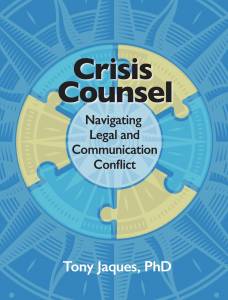Why you need to encourage dissenters and doubters
by Tony Jaques, Director of Issue Outcomes Pty Ltd, for people who work in issue and crisis management
A scathing assessment of management failure at disgraced PwC exposed the company’s “whatever it takes” approach, which led to partners turning a blind eye to bad behavior in pursuit of profit.
While that judgment dominated the headlines, of special interest to communicators and crisis managers was the reported unwillingness of executives to question a dominant CEO.
PwC-commissioned reviewer Ziggy Switkowski found that an “overly collegiate culture” – focused on fostering relationships between long-serving partners – stifled any form of criticism or reflection on the firm’s mistakes or the risks it was taking.
“PwC Australia exhibits a ‘good news’ culture at the enterprise level where ‘good news gets communicated, and bad news gets held back’,” the review said. “In practice, there is not a lot of constructive dissent, with relationships and loyalty being key to career progression.”
Mr Switkowski found “a general hesitancy to delve into uncomfortable conversations, to learn from mistakes and to be prepared to hold others to account.”
Sadly, a lack of “constructive dissent” is by no means uncommon. The truth is too many companies, government departments, and other organizations, have a culture where only good news flows upwards to the executive suite.
As Kurt Stocker, formerly at Northwestern University, Chicago, has written: “Keep in mind that top management, by definition, is the least informed group in the company when it comes to bad news. Nothing moves more slowly than bad news running up a hill, a very steep hill”.
A chilling example of this problem was revealed some years ago following the disastrous explosion and refinery fire at BP Texas City, which killed 15 workers, injured 180 others, and severely damaged the refinery. Researcher Andrew Hopkins found a culture at BP where many top people knew of safety and production problems at the refinery, but few would speak up. “Only good news flowed upward. No one dared say the wrong thing or challenge the boss.”
BP’s then-CEO, Lord Brown (who soon lost his job in an unrelated scandal), eventually admitted the disaster was at least partly his fault. “I wish someone had challenged me and been brave enough to say, ‘We need to ask more disagreeable questions’.”
Another example of an autocratic CEO who wouldn’t listen was exposed in the notorious phone-hacking scandal in the UK. The British Parliamentary inquiry concluded Rupert Murdoch was not a fit person to lead a major corporation and that he “turned a blind eye and exhibited wilful blindness to what was going on in his companies and publications.”
The media mogul didn’t just plead ignorance but went further, claiming that some of his own (unnamed) executives deliberately kept him in the dark.
Similarly, the former independent Directors of scandal-plagued Australian Crown Casino claimed they were unaware of the problems because they were “deprived of information from management”.
Such cases are a stark reminder that wilful blindness – and its cousin, lack of constructive dissent – are a major risk when it comes to issue and crisis management. Indeed, blocking bad news or warnings for any reason can lead to disaster.
The need to listen to dissenting opinions in a crisis was neatly captured by an unnamed manager in a global study about the role of the CEO: “One of the most important things is having people around you who tell you how wrong you are.”
In the same vein, American academics Paul Nystrom and William Starbuck once argued that top managers should listen to and learn from “dissenters, doubters, and bearers of warnings” to remind themselves that their own beliefs and perceptions may not be correct.
Rightly or wrongly, in many organizations, the role of dissenter – or devil’s advocate – falls to the communication professional. It’s a role that needs to be handled with care to avoid being labeled a troublemaker or not a team player. But being able to disagree without being disagreeable is an essential part of helping decide what’s best for the organization.
+++++++++++++++++++++
A Parting Thought
The fewer the facts, the stronger the opinion.
Arnold H. Glasow
++++++++++++++++++++++
Learn more about Reputation Risk, CEO apologies, and Crisis communication in Tony Jaques’ new book, Crisis Counsel: Navigating Legal and Communication Conflict.
Find Tony’s book at Amazon.com
confirms Tony Jacques’ position as one of the industry’s foremost experts on issues and crisis management. In addressing the complex interactions between legal and communication crisis responses. Dr. Jacques provides riveting case studies and practical advice. It highlights the financial and reputation risks of not effectively integrating communications and legal counsel. It should be on every communications practitioner’s reading list, and companies should insist their in-house and external legal counsellors read it.” – Noel Turnbull, Former Chair of Turnbull Porter Novelli, Adjunct Professor, RMIT University.

 “
“